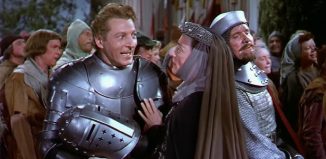Alan Alda turns 80, dedicates second act to science
Steven Strogatz picked up the phone to hear the familiar voice of someone he’d never met.
“I got a call from out of the blue, which was really shocking,” said Strogatz, a math professor at Cornell University. “He said, ‘this is Alan Alda. I don’t know if you know me, but I’m an actor.’”
Alda had read an article Strogatz wrote for Scientific American about synchronization in the natural world, which included phenomena like thousands of male fireflies flashing in unison like a Christmas tree. Alda said he wanted to discuss the article.
The Manhattan-born actor visited Strogatz, who was then at MIT in Massachusetts.
“He was this super-famous TV and movie actor,” Strogatz said. “He was not particularly well-known for work in science communication, like he is now.”
At the time of his call to Strogatz, which was more than 20 years ago, Alda was only one year into hosting the PBS series Scientific American Frontiers, in which he wound up interviewing hundreds of scientists during the 11 years he hosted the program.
Alda, who is turning 80 on the Thursday this newspaper comes out, has developed a second career as a science communicator, winning a star-studded list of new fans who appreciate his passion, intellect and, most of all, thirst for knowledge that has turned this seven-time Emmy winning actor into a champion of scientific knowledge and scientists.
Alda is “phenomenal,” said Eric Kandel, the director of the Kavli Institute for Brain Science at Columbia University. Kandel explained that Alda and a talented Norwegian journalist have been the master of ceremonies for the Kavli Prizes, which are given out in Oslo, Norway, every two years to researchers in astrophysics, nanotechnology and neuroscience.
The prestigious Kavli awards are modeled after the Nobel Prize. Kandel, 86, knows a thing or two about those awards as well: he shared the Nobel Prize in 2000 in Physiology or Medicine.
Alda has helped teach Kandel about the communication of science. Alda’s “range is quite broad and his ability to communicate is quite remarkable,” Kandel said.
Kandel attended an 80th birthday bash for Alda a few weeks ago. He took a turn talking to those celebrating an extraordinary life.
“What had been emphasized by the family was his acting career,” Kandel said. He described two important features about Alda.
First, “He’s revolutionized the communication of science to the public. He’s made an enormous impact. He does not have a peer.” And second, “He’s the most unpretentious guy you’ve ever met. You’d never have thought he’d done a movie.”
In 2006, the unpretentious Alda approached Shirley Kenny, the former president of Stony Brook University, about starting a center that would help scientists share their goals, approaches, and results with the public.
Alda met with several people in East Hampton, including Howard Schneider, the dean of Stony Brook’s journalism school.
“The creation story” that explains the origins of the Center for Communicating Science, “starts with this porch meeting,” Schneider said.
When the group returned from East Hampton, they discovered that there were occasional programs and courses and workshops about communicating science, but there didn’t appear to be any center devoted exclusively to “improving the ability of scientists to communicate with the public,” Schneider said.
Aided by former U.S. Rep. Tim Bishop and current U.S. Rep. Steve Israel (D-Huntington), Stony Brook applied for, and received, a federal grant of $220,000 to start the effort.
Alda “was the inspiration and remains the inspirational figure in this effort,” Schneider said.
The seed money led to the founding in 2009 of the Center for Communicating Science, offering students an opportunity to learn how to connect with a range of audiences through various types of training, including improvisational acting, which is the only training Alda received.
Improv requires people to listen to what other people are saying and build off of that, forging connections through shared common ground, Schneider said.
“One rule of improv is that you say, ‘Yes and,’” said Elizabeth Bass, a founding director at the center. “You have to take what [the other person] gives you and add to it.”
Valeri Lantz-Gefroh, the improvisation director at the center, came from the world of theater to the center. She said Alda helped her learn more about a “skill I’ve been working on for 30 years by teaching it in a different way. That gift has come from Alda.”
Indeed, scientists who have taken these courses suggested that they have been invaluable in helping them deliver their message and connect with their audience.
Colin West, a research assistant at the C.N. Yang Institute for Theoretical Physics at Stony Brook, took six courses at the center. Before he attended the classes, he said he was introverted.
“It’s not enough to eschew the jargon from my own vocabulary,” West said. “I should be trying to understand the jargon and phraseology that’s typical in their patterns of thought and incorporate them into my language.”
Alda has also helped a wide range of scientists. He has “made many of us look from the outside at what we do and ask how we can do better in telling our stories and be more engaging about our fields,” said Louise Leakey, a research professor in the department of anthropology at Stony Brook who works on human evolution in Africa.
Alda asked Leakey to sit on the advisory board at the center because she was working to make the fossil collection accessible online and set up a citizen science project in paleontology.
The notion of sharing science with non-scientists has only recently become more acceptable and more popular, in part because scientists are struggling to get funding for projects ranging from basic science exploring physical properties at an incredibly small scale to discoveries that might help treat diseases like cancer, Alzheimer’s disease or schizophrenia, researchers said.
Alda has continued to be a driving force at the center, which, in 2013, was renamed the Alan Alda Center for Communicating Science. In what friends suggest was typical self-deprecating fashion, Alda said he was flattered that the school was named after him and suggested that, to that point, only a horse had shared his name.
Committed to the center and passionate about science, Alda continues to keep a schedule that would exhaust someone half his age. Years ago, he shot his final episode of The Blacklist, in which his character, Alan Fitch, dies.
That night, Alda flew to Chicago to give a talk as the keynote speaker of the American Association of Medical Colleges to an audience of more than 1,200. Alda didn’t get his wake up call and got up 20 minutes before his 8 a.m. speech, when he inspired leaders about the need to share science with the public.
That night, Alda flew back to New York, where he opened on Broadway in a matinee of “Love Letters.”
Bass said Alda’s work ethic has inspired others at the center.
“We want to help” these efforts become “an important part of his legacy,” Bass said.
It’s a legacy that continues because of a lifesaving surgery Alda had when he was meeting with a scientist in Chile in 2003.
When a local surgeon made a diagnosis and told him the procedure, Alda said he’d need an end-to-end anastomosis. The surprised surgeon asked him how he knew that, and Alda said he used to pretend to perform that in the show “M*A*S*H.”
Friends, colleagues, and scientists appreciate the active intellectual life Alda and Arlene Alda, who have been married close to 59 years, share.
Arlene Alda, a photographer and children’s book author, and her husband have numerous books in their house, Strogatz said. They use these books to continue to feed their curiosity. Alda has also asked Strogatz to give him geometry problems to solve.
“He works on them with great effort for weeks or months at a time,” Strogatz said.
For Alda, the final product, however, is less important than the process. And that process continues as Alda heads into another decade.
These days, the people who imagine his distinctive voice aren’t picturing Hawkeye Pierce in a red robe running to a helicopter so much as they are looking for inspiration in their efforts to share the wonder and beauty of science.
“Sometimes when I have to explain a complicated topic to a nonscientist, I imagine Alan sitting next to me and asking me questions like I’m a guest on Scientific American Frontiers,” West said. “Trying to envision what questions he would ask often helps me figure out what answers to give.”






